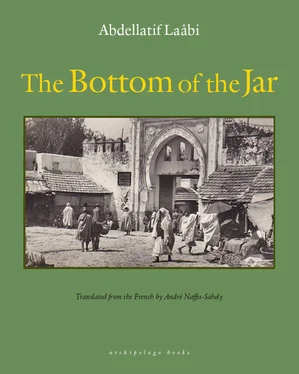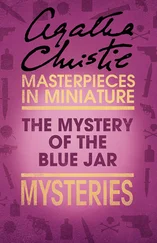The conversation began with a formal exchange of information, each party having conveyed the questions they wanted answered in great detail beforehand. Nevertheless, the official answers were no less intriguing. Accordingly, Ghita glibly maintained that our family — on my father’s side — was also related to the Prophet. That we were descended from the sharif of Jbel el Alam, whose shrine was still venerated in the country of the Beni Arouss. Whereas her family was originally from Andalusia, which I can confirm, and still possessed the key to the house where they had lived before the Muslims were expelled from that land, which rightfully belonged to Islam. In her version of the story, my father, a humble artisan in the Sekkatine souk, had been promoted to the status of a merchant, whom God had showered His blessings on. If this was the case, why did he not then enjoy the title of haji? The reply was simply: Health problems had prevented him from making the pilgrimage to Mecca the year before. But he will do so next year, inshallah!
Having finally arrived to the topic of my brother, Ghita rose to the art of the panegyric. From a mere office clerk, he had become a high-level manager of the Department of Postal Services and Telecommunications. There wasn’t a letter — or especially a money order — that reached its destination without first passing through his hands. It was he who was in charge of the teeleephoone . With expert knowledge of French and a handful of English words, he was presented as a polyglot genius who spoke a balbal of seven languages fluently. To conclude, Ghita began to list his more conventional qualities: He lacked nothing, neither respectability, nor youth, nor beauty. Nor kindness for that matter, nor reserve, respect for his parents, and faith in God. While reciting his praises, she curiously omitted his time in prison. Clueless about politics, she must have assumed that prison was just prison, and that it was nothing to brag about. And, as if chasing that unpleasant memory from her mind, she threw herself into lyricism: “The light shines on his face. May God keep him — and your daughter too — from the evil eye.”
Having thus cleverly engineered a transition in the conversation, she asked point-blank, “By the way, where is the little darling?”
“She’s coming,” her mother replied. “We are going to drink some tea that she herself has prepared — you’ll see, whatever she touches, turns to gold.”
As if she had been waiting for just that signal, Lalla Zineb appeared, carrying a tray of tea that she placed at her mother’s feet before taking a seat in front of my mother. Ghita’s eyes lit up, scrutinizing her from top to bottom and back again. A strange smile formed on her lips, the very same expression I had often seen adults make when a pretty woman passes them in the street.
The tea had barely been poured when Ghita took the initiative.
“Why, I’ve forgotten something — may death forget us — I’ve brought some walnuts, and some dates — may our days be as sweet as they are.”
And hoping to gain the upper hand in her future relationship with her daughter-in-law, she turned directly to Lalla Zineb.
“Go and put them on a plate, my daughter.”
The young girl did as she was told. A moment later, she had meticulously arranged the fruits and nuts on a plate of china, decorated in the taous style and adorned with a peacock. Encouraged to help herself, Ghita disdained the sweetness of the dates and instead chose a large nut, which she held out to Lalla Zineb.
“Would you open it for me, my darling? I have no teeth left to speak of, while yours — thanks be to God — should be intact.”
Faced with such an unseemly question, Lalla Zineb seemed to hesitate. Aware of this subterfuge — the “nut test” being a means by which the health of her teeth could be judged — Lalla Zineb’s mother encouraged her daughter with an air of amusement.
“Go on, my daughter, don’t disappoint our guest.”
Lalla Zineb once again carried out the instructions. The test proved conclusive. Ghita was delighted and was already half listening to the mistress of the house as she began to soliloquize.
“Now where was I? Ah yes, my daughter has had to stop her studies. There are far too many ruffians on the way to her college. Fez is no longer what it used to be. The country bumpkins have taken over. And with everything that’s going on at the moment, the military strut around thinking they can do as they like. Oh yes, it’s just like in the fourteenth century, there’s no peace to be had, no sleep either. Therefore her grandfather decided that the girl should stay at home since, you see, he is the one who makes all the decisions in this family.”
Put on her guard by that last detail, in which she detected a trace of hesitation, Ghita went on the offensive.
“Let’s be clear, Lalla, we need to make haste. We want Lalla Zineb to take her place in her new home before the end of the summer, in time for when Si Mohammed will be on leave.”
“We will do everything in our power to put you at your ease,” replied the girl’s mother, ever the diplomat.
Satisfied with having scored a point, Ghita had in the meanwhile come up with a second test. Rummaging in the pocket of her djellaba, she pulled out a scarf that she had prepared beforehand, having knotted it into a sort of ball, and without any warning, she threw it with a disconcerting precision toward Lalla Zineb’s belly. Comfortably seated on the mattress, the girl reacted swiftly and intercepted the ball by clasping it between her thighs with a goalkeeper’s dexterity.
These fine-tuned reflexes were a source of true relief for Ghita. Had the young girl opened her thighs while catching the ball, it would have signified a moral laxness. But her reactions had proved that she knew how to defend her honor.
“Come, my daughter, let me embrace you,” my mother said, thereby bringing her visit to an end.
Visibly satisfied, she got up and adjusted her veil, ranting once more against this constraint on her freedom.
“Couldn’t they have found anything better to stick to our faces than this rag? What is it with our faces? Leprosy maybe? Fine, I’ll leave you to it now.”
Ghita thought she had carried out her mission brilliantly. Now it was time for the men to take over.

THE PREPARATIONS FOR Si Mohammed’s wedding had coincided with particularly gloomy events in the history of the country.
The situation was serious. The conspiracy instigated by the French authorities with the complicity of the pasha Thami el-Glaoui and the traitor theologian Abdelhaï Kettani had succeeded. Mohammed ben Youssef had been deposed and forced into exile, first in Corsica and then in Madagascar. Mohammed ben Aarafa, an obscure and obedient member of the royal family, had been proclaimed sultan in his stead.
A mourning veil had descended upon our city. The wedding celebrations of Si Mohammed and Lalla Zineb took place without any fanfare. There were no orchestras playing Andalusian music nor taqtouqas by Jabaliyya musicians. The ceremony took place according to the strict regulations announced by Radio Medina, which had increasingly fallen under the control of militant nationalists who hadn’t contented themselves with the usual channels. A week before the happy event was to occur, someone slid a note written on a piece of blue paper — the sort used to wrap sugarloaf — under our door. It spelled out the threats of reprisals we would incur if we allowed ourselves to get carried away by the festivities. By way of signature, the paper was stamped with a crude bloodstain, which no doubt came from the fresh spleen of a calf or a sheep.
Читать дальше













